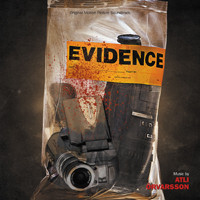- Composed by Atli Örvarsson
- Varèse Sarabande / 2013 / 38m
A series of recording devices are rather fortuitously left behind at a crime scene in Olatunde Osunsanmi’s Evidence, allowing detectives to piece together the crimes that have been carried out against a group of bus passengers who’ve been knocked off one by one in the middle of the desert. Evidence comes in many forms and I have used my own playback devices to piece together a series of clues as to the musical pedigree of Icelandic composer Atli Örvarsson. It’s fair to say that I haven’t been what might be termed his biggest fan to date, with (from what I’ve experienced – there might be hidden gems elsewhere of course) a series of terrible scores behind him including the execrable Hansel and Gretel earlier this year. Therefore my keen reading of the evidence suggested Evidence wasn’t likely to be a masterpiece – but who knows?
Well, it isn’t a masterpiece. Indeed, the French might say – and I might later hear them saying it if a recording device were nearby at the time – ce n’est pas un chef-d’œuvre. Au contraire! In fact, the 38 minutes that pass while this album makes its way through my playback device consist mostly of a series of squeaks and pops. I bought a new pair of headphones recently which had a fault in the right-ear speaker, meaning a distracting crackling noise was emitted whenever I moved my head even slightly. If I hadn’t actually been listening to any music at the time, but just the crackling, it would have sounded much like this album. The little John Powell-style ostinato that recurs irritatingly frequently is the only real evidence of music here at all; essentially, it’s just sound effects. And I can’t particularly say that I want to listen to an album of sound effects. It’s been a while since I heard an album quite this objectionable.
Rating: No stars
facebook.com/moviewave | twitter.com/MovieWaveDotNet | amazon.com












You ought to give a listen to The Eagle or Babylon A.D…It seems like you’ve been reviewing all of Orvarsson’s worst scores while tiptoeing around the ones that actually show off a bit of talent.
Thanks for the tips. I think I actually have The Eagle somewhere.
With James Horner at three rejections and counting this year, I wonder how Örvarsson feels about being the only composer to be rejected in favor of Horner in recent memory?
I must admit, that I really liked ‘Hansel&Gretel’. And this is coming from one of the most enthusiastic RC-basher on the web.
I have a thing for monster hunter flicks (including Van Helsing, Constantin and Abraham Lincoln Vampire Hunter) and H&G was just what I wanted…from film and from score. Okay, yeah, he could have sticked more to the opening title-style, but I think the rest was just…badass! Nice guitar-work and I even liked the electronics.
Also I’m guilty of loving Jackman’s score for old Abe killing vampires. Of course, they are not as well composed as ‘Priest’ or ‘an Helsing’, but they are fun, really fun and that’s all I wanted.
Having now heard this score, I must agree that the vast majority is fairly awful. However, there are a few brief passages in there that I actually found reasonably dynamic…the final two minutes or so of “Check the Tape,” for instance. I wish Orvarsson had made that the defining style of the album, and not the sound-designy-crackling stuff. Nevertheless, I think there’s enough in there that the album deserves, if nothing else, at least one solitary star. Then again, I might just be saying that because I don’t believe in “no stars” ratings.
I’m still trying to figure out how best to introduce negative ratings.